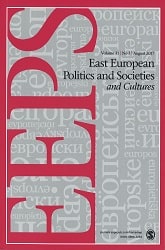Class after Communism: Introduction to the Special Issue
Class after Communism: Introduction to the Special Issue
Author(s): David OstSubject(s): Political history, Government/Political systems, Culture and social structure , Social differentiation, Transformation Period (1990 - 2010), Post-Communist Transformation
Published by: SAGE Publications Ltd
Keywords: class; sociology; eastern Europe; stratification;
Summary/Abstract: After 1989, class appeared to be everywhere and nowhere. The messy consequences of the emergence of new classes and new types of economic inequalities were plain for all to see, but no one uttered the term “class.” The concept appeared illegitimate because of associations with the old regime, even though it always had more success explaining developments in the capitalist world east Europe was entering than the state socialist world it was leaving. The media and academy adopted a discourse of “normality” instead: New rules resulted not from policy choices empowering certain groups at the expense of others but from necessity, and people just had to adapt. Because the economic collapse nevertheless elicited much anger and frustration, the absence of class talk contributed to a proliferation of nationalist talk, and thus had political consequences. The paper rehearses reasons for the decline of class analysis in the region, and notes the post-1989 fascination with the “middle class.” It explores the evolution of class analysis during the communist period, culminating in the embrace of a stratification theory that resisted discussion of power, which made sense at the time but became a burden after 1989. Several critical class analyses of state socialism, from the 1930s to today, are then introduced, demonstrating both their relevance and their unfortunate absence from debates. New types of class analyses promoted by younger scholars and activists are emerging, however, and are discussed in the summaries of the other essays in this collection.
Journal: East European Politics and Societies
- Issue Year: 29/2015
- Issue No: 03
- Page Range: 543-564
- Page Count: 22
- Language: English
- Content File-PDF

